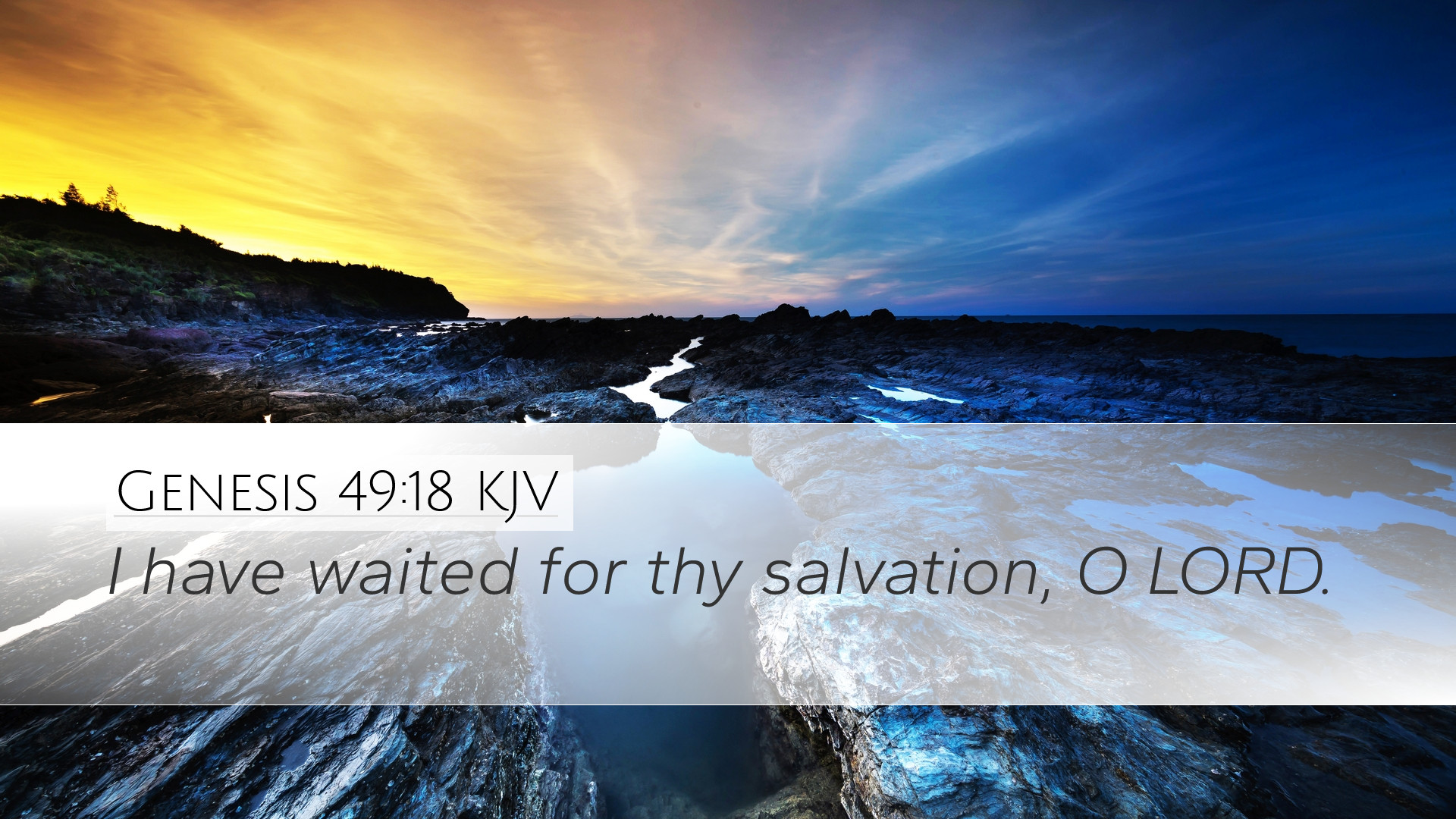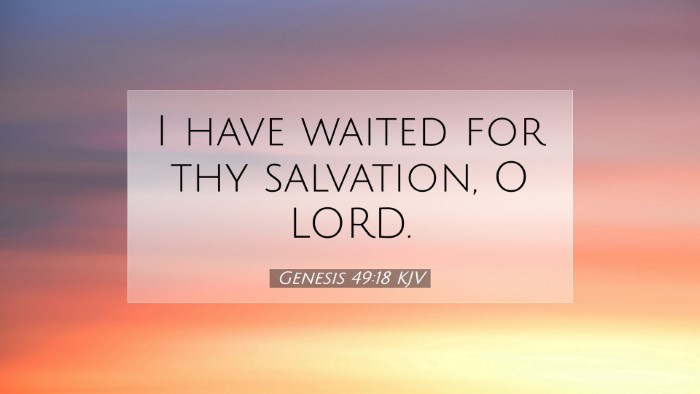Commentary on Genesis 49:18
Genesis 49:18 states, "I have waited for your salvation, O Lord." This poignant verse comes from Jacob's blessings and prophecies over his sons. It reflects a deep anticipation of divine salvation and underscores theological themes prevalent throughout Scripture.
Introduction
This verse serves as a critical reflection of Jacob’s faith amidst trials and tribulations. As we explore insights from eminent biblical commentators, we can appreciate the layers of meaning embedded within this simple yet profound statement.
Commentary Insights
Matthew Henry's Commentary
Matthew Henry emphasizes the significance of Jacob's longing for salvation. He asserts that this verse encapsulates the essence of hope and the expectation of divine deliverance. Henry notes that Jacob faced countless hardships, yet his eyes were firmly set on God's promises. The phrase "I have waited" highlights a patient endurance that speaks to the believer's posture toward God.
Henry expands on the notion that this waiting is not passive; rather, it reflects an active trust in God's temporal and eternal plans. Jacob's recognition of the need for God's salvation indicates his understanding of human limitations and the reliance on divine intervention. In this, Henry invites readers to consider their own wait for God's deliverance in their lives.
Albert Barnes' Notes
Albert Barnes offers a textual analysis that accentuates Jacob's profound faith in God's salvation. He points out that the term for "salvation" (*יְשׁוּעָה*, *yeshuah*) not only conveys deliverance but also embodies the broader concept of restoration and wholeness—an important aspect for those studying biblical covenants.
Barnes highlights that this verse should be viewed in the context of Jacob's entire emotional journey. His life was marked by conflict, both internal and external, and Barnes argues that this waiting reflects a climactic point of trust amidst life's uncertainties. This sentiment resonates deeply with believers facing trials, reminding them of the importance of waiting on the Lord.
Adam Clarke's Commentary
Adam Clarke brings a pastoral dimension to the analysis by exploring the emotional weight of Jacob's statement. He posits that this verse represents a moment of clarity in Jacob's life, where amidst familial strife and personal failures, he turns his gaze to God.
Clarke notes that the anticipation expressed in this verse is prophetic in nature, perhaps pointing toward the coming Messiah. He encourages readers to think critically about their own expectations from God. Are they waiting for a specific salvation, or are they embracing a broader understanding of God's work in their lives?
Theological Implications
The act of waiting, as illustrated by Jacob, serves as a powerful reminder of the believer's relationship with God. It suggests a theology that values patience and trust over immediate gratification. This theme is reiterated throughout Scripture, compelling an expectation of God's ultimate plan for redemption.
Waiting as a Spiritual Discipline
- Patience in Suffering: The lives of the faithful are often marked by periods of waiting, echoing Jacob’s experience. This theme encourages believers to find solace in their trials.
- Hope in God's Promises: The anticipation of God's salvation reinforces the need to cling to His promises, affirming faith in the unseen.
- Active Expectation: Waiting is not a passive endeavor; it requires active engagement in prayer, worship, and the study of Scripture.
Practical Applications for Leaders and Scholars
For pastors and theologians, Genesis 49:18 beckons a deeper exploration of the relationship between faith and expectation. Here are some practical applications:
- Preaching Themes: Use Jacob's waiting as a thematic focus during sermons on hope and perseverance.
- Teaching on Divine Timing: Discuss the importance of understanding God's timing in personal and communal contexts.
- Counseling Guidance: Offer a framework for individuals struggling with waiting on God through the lens of Jacob's faith.
Conclusion
In conclusion, Genesis 49:18 encapsulates the essence of waiting for divine salvation—an act of faith intertwined with hope, expectation, and trust in God’s promises. As illuminated by esteemed commentators, it serves as a powerful reminder for contemporary believers to embody patience and faith amidst life's uncertainties. Jacob's declaration invites us all to reflect on our own waiting and to recommit ourselves to a posture of prayerful anticipation of God's intervention in our lives.


